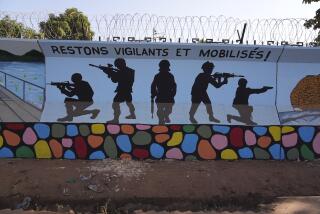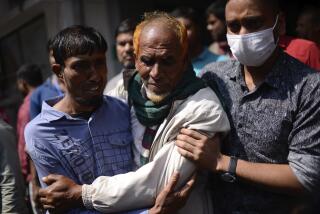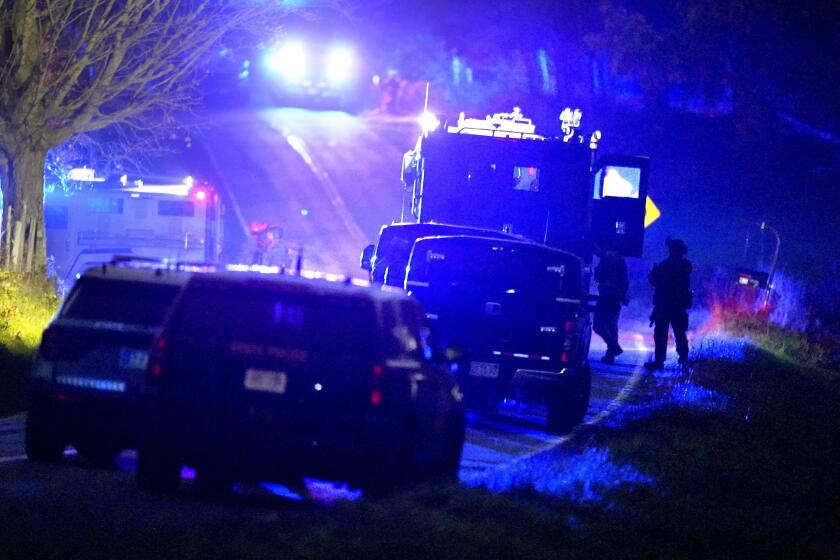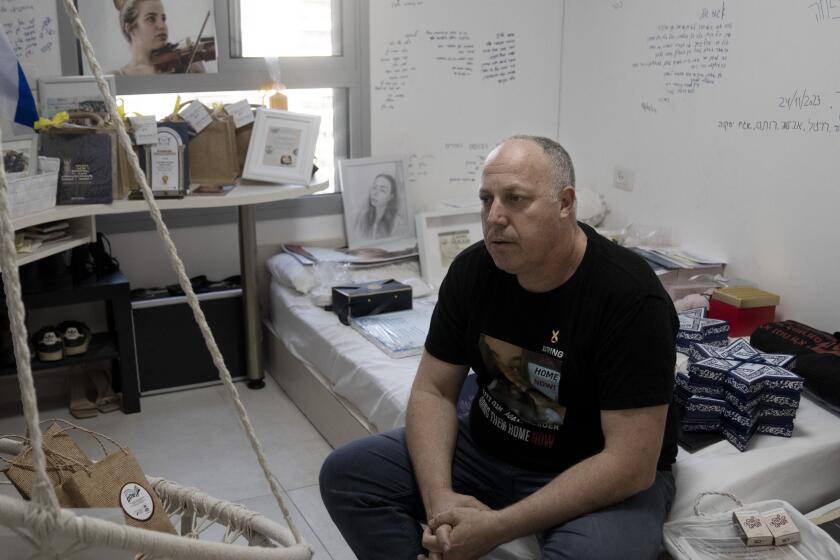Upscale Kenyan mall becomes terrifying battle zone in deadly attack
JOHANNESBURG, South Africa — Cafes were humming with a weekend lunch crowd. Visitors were anticipating a competition for child chefs. Suddenly, Nairobi’s Westgate Mall erupted in gunfire and explosions, sending people scurrying for safety, barricading themselves in storerooms and kitchens. Some played dead.
At least 39 people were killed and 150 wounded Saturday in Kenya’s worst terrorist attack in 15 years, President Uhuru Kenyatta said. The Shabab, a Somali group linked to Al Qaeda, claimed responsibility, saying the attack was retribution for the country’s invasion of its eastern neighbor two years ago that was aimed at controlling the Islamic militants.
As Saturday night turned into Sunday, security forces were reported to have surrounded attackers still holding an unknown number of hostages in the upscale shopping complex. The Shabab said it was in touch with militants in the mall and rejected negotiations to free the hostages.
“The Kenyan government is pleading with our mujahedin inside the mall for negotiations,” it said in a Twitter message shortly before its account was suspended. “There will be no negotiations whatsoever at Westgate.”
Witnesses who escaped the mayhem said gunmen fired at people from an upper floor, and terrified shoppers scrambled to get out of the building, some crawling on their hands and knees. The attack left pools of blood, bodies, discarded shoes, broken glass and spent cartridges.
The assault on a crowded mall, a favorite haunt of affluent Kenyans, diplomats, expatriates and tourists, appeared to be designed to exact maximum casualties and international media exposure. However, it seemed intended primarily to punish Kenya rather than to target foreigners.
Among the dead were two Canadians, including a diplomat, and two French citizens, officials of those countries said. Secretary of State John F. Kerry said there were no reports of Americans being killed, but the wife of an employee of the U.S. Agency for International Development had died. Four Americans were reported injured.
Kenyatta said he had lost some close family members in the attack.
Military and police helicopters flew over the shopping mall as ambulances rushed victims to nearby hospitals. The Kenyan army and special forces were called in to reinforce police. Kenya’s Citizen TV aired video of victims arriving by ambulance at hospitals, including some who had been shot in the head and others covered with blood but walking.
It was unclear how many attackers there were. Kenyan news reports said that two suspects had been killed by police or special forces.
The masked gunmen, said to have entered the mall through a cafe on a veranda, reportedly let Muslims go and targeted non-Muslims. Kenya’s Daily Nation newspaper reported that people who couldn’t recite Muslim prayers were killed.
Umar Ahmed, an 18-year-old who was injured by a grenade, told Kenyan television he was in the rooftop parking area when he heard shooting and screams. He tried to flee, but a gunman saw him and threw a grenade toward him.
“I got scared,” Umar said. “I tried to run down the stairs and saw someone running toward the top. I ran back and hid behind one of the cars.”
He said he played dead. A gunman turned him over to make sure he was dead and then left him lying there.
Children were among the dead. Westgate Mall is always crowded but had attracted extra visitors for a Junior Super Chef competition, one in a series being held each Saturday for chefs ages 8 to 16.
One man told the BBC he had hidden in a storeroom before being beckoned by restaurant staff into a kitchen, where a group of people had sought safety, barricading the doors with giant refrigerators.
Another witness told Citizen TV that he saw a foreign gunman change his clothes, putting on a maroon shirt and jeans and then mingling with people escaping from the mall. He said he told police, who took no action. Cafe employee Patricia Kuria told reporters she saw two gunmen wearing black turbans.
The assault reminded many Kenyans of Al Qaeda’s 1998 attack on the U.S. Embassy in Nairobi, which killed more than 200 people, most of them Kenyans.
The Shabab has launched small-scale attacks since Kenyan armed forces invaded Somalia two years ago, but Saturday’s was by far its most severe. Like previous terrorist operations in Kenya, the assault is likely to severely affect the tourist trade, which is vital to the country’s economy.
Kenya has long been concerned with the chaos across its eastern border. Somalia has not had a functioning central government for most of the last 20 years, helping create an influx of refugees, along with piracy in the Indian Ocean, and threatening to spread Islamic militancy to Kenya.
Though the Shabab is linked to Al Qaeda, it has focused narrowly on Somalia rather than a global anti-Western agenda. Militants have been pushed out of Mogadishu, the Somali capital, by an African Union force and the country’s weak government, but they have conducted a number of high-profile bombing and shooting attacks in the city.
The group launched its first attack outside Somalia’s borders in 2010, when two bombings in Uganda killed 76 people who were watching the World Cup soccer finals at a restaurant and rugby club. It said the bombings were to punish Uganda for taking part in the African Union mission.
Kenyatta said in his television address that the military and police operation at the mall was “delicate” because the main priority was to save the lives of hostages. He vowed that the gunmen would be caught and punished.
“We have overcome terrorist attacks before,” he said. “We have fought courageously and defeated them in and outside our borders. We will defeat them again.
“I urge all Kenyans to stand together and see this dark moment through.”
Medical authorities called for blood donations.
The Shabab’s Twitter accounts have been suspended several times. The latest account had been up a little more than a week when it was suspended Saturday, hours after it said it was time to attack Kenyans in their own country. It also used the Twitter account to claim that 100 people had been killed.
“The attack at Westgate Mall [is] just a very tiny fraction of what Muslims in Somalia experience at the hands of Kenyan invaders,” the group said. It said it had warned Kenya to remove its soldiers from Somalia or face severe consequences.
“The Kenyan government, however, turned a deaf ear to our repeated warnings and continued to massacre innocent Muslims in Somalia,” the Shabab said in a series of tweets. “For long we have waged war against the Kenyans in our land, now it’s time to shift the battleground and take the war to their land.”
Kenyans posted condolences and sympathy messages on social networks, along with angry messages to the Shabab’s Twitter feed before it was suspended.
Some speculated that the presence of Israeli-owned shops in the mall may have made it a target. However, the Shabab’s operations and rhetoric are mainly concerned with its struggle for control of Somalia. Its claim of responsibility mentioned only Kenya’s role in Somalia, including Kenyan air force attacks that it claimed had killed civilians.
Kenya has cooperated closely with the United States in fighting Islamic militancy, and U.S. officials condemned the attack.
“Today’s terrorist massacre of so many innocents is a heartbreaking reminder that there exists unspeakable evil in our world which can destroy life in a senseless instant,” Kerry said in a statement. He said that such attacks “must reaffirm our determination to counter extremism and promote tolerance everywhere.”
U.N. Secretary-General Ban Ki-moon called Kenyatta to express his concern.
Kenyan Secretary for Foreign Affairs Amina Mohamed condemned the attack as “inhumane and vicious,” and aimed at “destroying our democratic values and our way of life.”
Times staff writer David S. Cloud in Washington contributed to this report.
More to Read
Start your day right
Sign up for Essential California for news, features and recommendations from the L.A. Times and beyond in your inbox six days a week.
You may occasionally receive promotional content from the Los Angeles Times.





